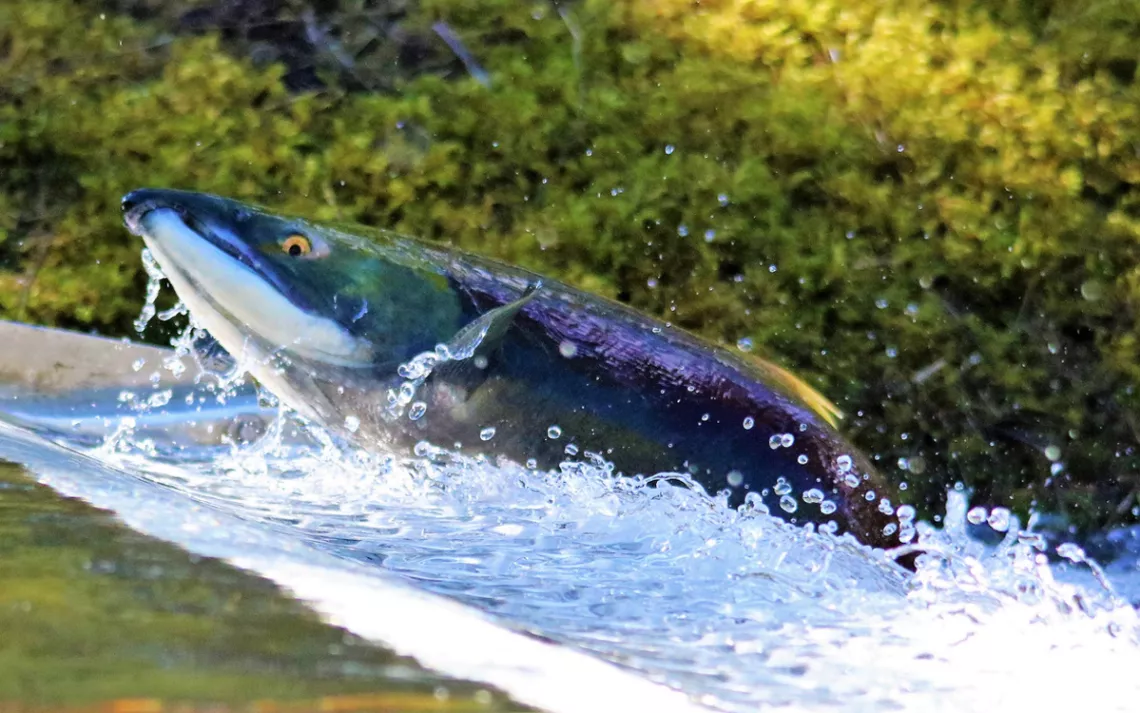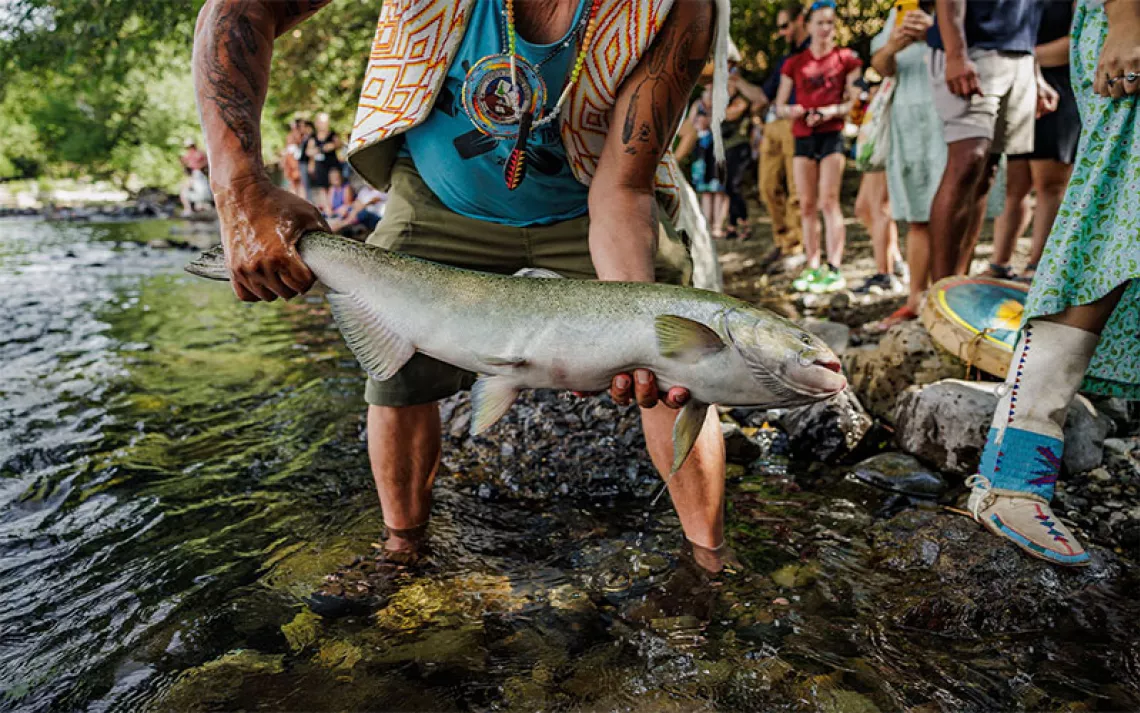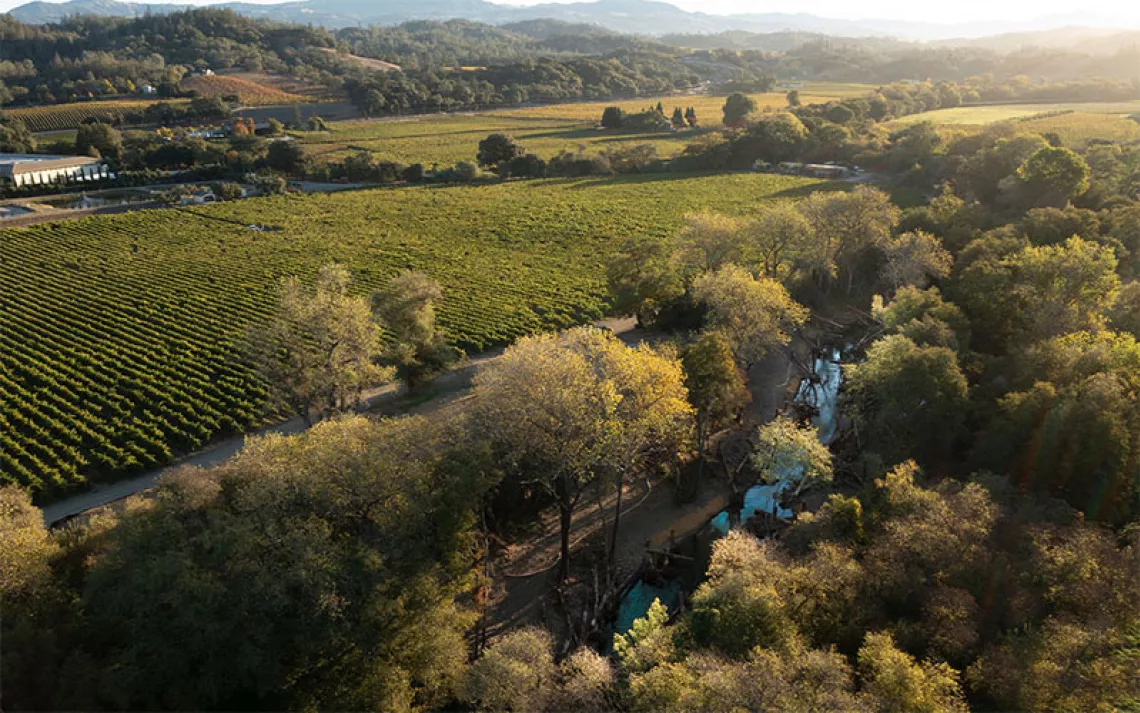Salmon Rebellion
First Nations have a plan to get salmon farms out of their waters

Photo by iStock | Christina Prinn
Last year on August 24, Ernest Alfred, an elementary-school teacher and hereditary chief from the 'Namgis, Lawit'sis, and Mamalilikala First Nations, boated out to Swanson Island, British Columbia, and began to set up tents with a small group of other First Nations activists.
A few days earlier, Alfred had been sitting in an emergency community meeting about the problem of the fish farms of the Broughton Archipelago. Many people, including Alfred, were certain the pens were the reason behind the long decline of wild salmon in their homeland. Decades of grassroots organizing and lawsuits had shifted the balance of power between BC’s First Nations and the Canadian agencies that had leased the areas to the fish farms in the first place. In June 2018, several leases in the waters of the Musgmagw Dzawada’enuwx First Nation would expire, and hopes were high that the leases would not be renewed.
But Marine Harvest, the Norwegian company that held those leases, wasn’t acting like they were expiring. Instead, it was making plans to restock the farms with smolts—young Atlantic salmon that wouldn’t be ready to harvest when the leases ended. Alfred didn’t think that the community could risk any more delays. Last fall, the wild salmon run in the archipelago had been frighteningly low.
“We probably have two years,” Alfred said. “We are not just talking about food security and what we eat. My brother is a guide. He takes tourists who come from all over the world, and he takes them to watch the grizzly bears. And the bears couldn’t catch any fish. There are probably cubs that went to sleep for the winter that didn’t get fat enough and won’t wake up next spring.”
Alfred and his niece, Molina Dawson, stood up at the meeting. “I’m not interested in this process anymore,” Alfred said. “I don’t want to write letters. I’m going to pack my bags and take my tent and go out to this farm, and I’m not going to move until something happens.”
When the group reached Swanson, they informed the Marine Harvest employees on-site that they were being occupied, then asked where to set up tents. “They thought it was pretty cute,” said Alfred. “They didn't take us too seriously at the beginning.” (Marine Harvest did not respond to an offer to share its version of events.) The occupiers set up camp on a floating walkway above the salmon pens.
The next day, a site manager for Marine Harvest seemed annoyed that they were still there. He came up to Alfred and told him he was trespassing. “No, you are,” Alfred said.
Alfred and a fellow occupier brandish jars of wild salmon. | Photo courtesy of Swanson Occupation
The waters of the Broughton Archipelago are home to at least two dozen salmon farms, according to a 2013 survey, but Alfred had chosen Swanson Island for one very specific reason: The island itself is the traditional territory of his mother’s ancestors. As long as Alfred stayed on the island, he was virtually untouchable. “It wouldn’t be right for me to go to someone else’s territory and say “get out,” Alfred said. “But I also chose it because it had not-too-bad cell coverage. Internet was very important.”
Internet was very important because Alfred did not intend to leave Swanson Island until he knew for certain that John Horgan, the premier of British Columbia, was not going to renew the leases in June. Still, even as Alfred stayed connected through the rest of the world via telecommunications, living on the island was an adjustment. “At this hour, baby seals on the island next to us sound like zombies out to get me,” Alfred wrote on his Facebook page one evening in September. “I'm going to bed!”
A supply boat arrives with shack-building materials. | Photo courtesy of Swanson Occupation
When the fish farms arrived in the 1980s, residents of the archipelago did not welcome them with open arms, despite promises of jobs and money. “Our people from the very beginning were very skeptical,” Alfred said. “Right off the bat, the old people—a lot of people call them ‘elders,’ but in my tradition the word that we use literally means ‘old people’—said, ‘Why would we do this when Mother Nature grows salmon for free? We would be acting as gods.’”
But it wasn’t up to the First Nations. The farm leases had been negotiated with the Canadian federal government. Over the next few decades, a series of court rulings gave legal backing to something that had always been historically true: Many of Canada’s indigenous tribes, particularly those in the western provinces, had never signed treaties giving up control over their territory.
In 1989, Carrier Lumber submitted a proposal to the BC government to log forest on Xeni Gwet’in land. In response, the Xeni Gwet’in declared the forest off limits for all logging, mining, and road building but said that non-natives were welcome to ask permission to “come and view and photograph our beautiful land.” It took the case decades to reach its conclusion, and when it did in 2014, a new legal precedent was set: Any First Nations land that was never formally ceded to the Canadian government could not be developed without the consent of those First Nations that have a claim to it. That included land that had been used for hunting or foraging, not just land that had been continuously occupied.
By then, BC’s native salmon population was in steep decline. “In the mid '90s—that's when my dad sold his fishing boat,” Alfred said. “The farms went in in 1989. We started to see effects almost right away.” Commercial fishery catches between 1995 and 2005 were the lowest in recorded history, and then the catch halved again between 2006 and 2014.
There were several theories as to why the salmon runs were diminishing. Salmon farms around the world were struggling with an epidemic of sea lice: tiny crustaceans that latch onto salmon in ocean waters and feed off their blood and tissue. Were fish farms providing year-round habitat to a parasite that normally would have limited opportunities to latch onto juvenile wild salmon as they emerged from streams and headed out to the open ocean? Scientific research showed that sea lice from fish farms could infect nearby wild salmon. Was that one reason why so few fish were coming back from the ocean each year?
Salmon farms were also facing periodic epidemics of piscine reovirus. A study by Alexandra Morton, a whale researcher who began studying fish farms after the area’s orca population declined, found that 95 percent of farmed Atlantic salmon had the virus, and that about 40 percent of wild Pacific salmon that spawned near the salmon farms, like those in the Broughton Archipelago, also had the virus. In areas of BC that were farthest away from salmon farms, the incidence of the virus was only 5 percent. Piscine reovirus causes heart damage, and some biologists surmised that it could be preventing wild salmon from making it to the ocean, or from surviving the long journey upstream to spawn.
But none of this changed the fact that, in the more than 20 years since salmon farming began, farmed salmon had become a $1.2 billion industry and BC’s largest agricultural export. A third of those salmon were coming from the Broughton Archipelago. Alaska had managed to ban farmed salmon, but it did so in the 1990s, before the industry got too powerful to overcome resistance. Meanwhile, companies like Marine Harvest had begun to hammer out agreements with some local tribes, which made agitating to remove the fish farms more politically complicated.
To Alfred, there’s no amount of compromise that would be worth hammering out. “It is a lot of money to these impoverished communities, but it’s a drop in the bucket to these companies,” he said. “The people who have signed those agreements are not proud of them.” According to Alfred, some tribal members believed that just getting the farms to operate differently might work: for example, moving pens farther away from traditional salmon migration routes, or closing down the farms periodically to break the lifecycle of any parasites or viruses.
But those changes were hard to monitor, hard to enforce. Alternative solutions to closing down the farms, like moving them far away from wild salmon and into facilities on land, weren’t happening fast enough. BC’s First Nations had started their own above-ground fish farm, Kuterra, which began farming in 2013, but no similar operations had followed. “The most important thing to remember is that it’s been done and we’ve proved our point,” Alfred said. “Its only downfall is that it doesn’t actually make money.” (Kuterra recently began to turn a profit but is unlikely to recoup its start-up costs.)
Marine Harvest's salmon farm seen from Alfred's cabin. | Photo courtesy of Swanson Occupation
A few weeks into the occupation, Alfred and the other occupiers (there have been anywhere from two to 18 people living on the island at any given moment) moved into an enclave of deserted cabins on the island, which had a good view of the Marine Harvest operation. Swanson Island is not the only occupation. Another Marine Harvest location, Midsummer Island, was occupied in September by a group of Musgamagw Dzawada'enuxw and Namgis, including Alfred’s niece. They agreed to leave in November after Marine Harvest filed an injunction against them in court. In October, the Matriarch’s Camp, led by Tsastilqualus Umbras, a Ma'amtagila grandmother, set up outside the offices of BC premier John Horgan in Langford, relocating at one point to the Department of Fish and Wildlife.
Gradually, it began to look like the occupations were having some effect. In October, Lana Popham, the BC minister of agriculture, sent a letter to Marine Harvest, warning it not to stock any more salmon at its farm in Port Elizabeth, whose lease was set to expire in June 2018, because “we are entering into sensitive discussions with some of the First Nations in the Broughton Archipelago who remain opposed to open net pen salmon farming in their territories.”
A few days later, Horgan said at a salmon farm industry meeting that companies needed to remember that their leases were “not in perpetuity.” Marine Harvest objected to this messaging. "If there's a better way to do business, we're always interested,” Marine Harvest Canada spokesman Ian Roberts told CBC News, “but today they are very, very good sites for growing fish."
Then, in November, a state senator in neighboring Washington announced he was planning a bill that would phase out all fish farm leases there. With the state spending hundreds of millions of dollars preserving wild Pacific salmon runs, said Senator Kevin Ranker, “raising invasive Atlantic salmon that we classify by state law as a pollutant makes no sense.”
The bill was almost certainly the direct result of the September escape of over 160,000 Atlantic salmon from a fish farm run by a company named Cooke Aquacultlure. Atlantic salmon have been used for West Coast fish farming because they are believed to not be able to survive in the Pacific Ocean on their own, and because they could live closer together than their Pacific cousins without attacking each other. Months after the escape, however, fishers in Washington are still reeling in Atlantic salmon. In December, Washington’s Department of Natural Resources terminated the lease on the farm where the escape took place.
Alfred spent New Year’s Eve on Swanson Island. “Swanson Occupation Day 131!” he announced cheerfully, camera trained on the orange-yellow Wolf Moon rising over the bay. “Happy New Year from everyone at Swanson Island Occupation!” He, some friends, and their children took all the pots and pans outside and banged them together in celebration. It wasn’t what he had planned a year earlier, but then, a lot of things had happened in 2017 that he hadn’t planned on, beginning with his decision, in August, to take a leave of absence from teaching and to occupy a fish farm instead.
As a hereditary chief, Alfred was raised with a particular responsibility to keep alive culture and tradition, and to carry it forward. “I quit my job so that I could have peace of mind,” Alfred said. “I didn’t want to lie to my students anymore about being stewards of the land when I wasn’t doing it.” A group of his former students, now high schoolers, organized two school walkouts in solidarity and demanded that the local supermarket not stock farmed salmon.
Alfred has heard that Marine Harvest will restock the pens off of Swanson soon. There are rumors afoot that the management of Canada’s fish farms would be taken from the Department of Fisheries, and Alfred remains optimistic. He suspects that early on in the occupation, Marine Harvest had tried to get a permit to evict him but then realized that his ancestral relationship to the land made that impossible. "They know,” Alfred said. “They know they are going to lose."
 The Magazine of The Sierra Club
The Magazine of The Sierra Club



